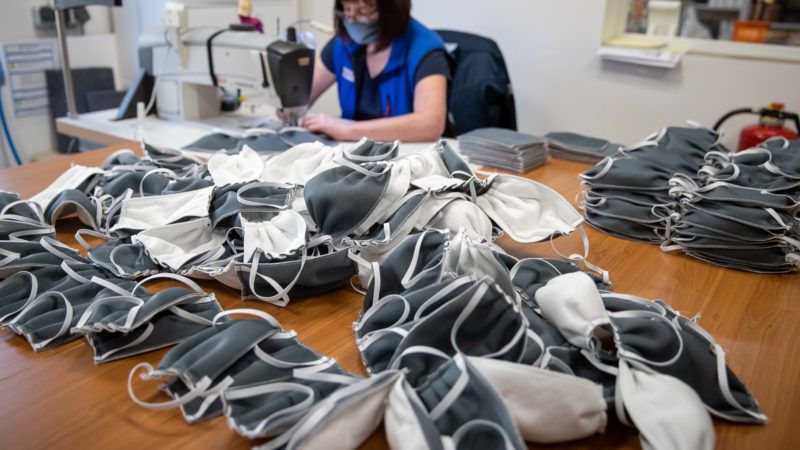Restricting Exports Makes It Harder To Fight Coronavirus
Export restrictions only make sense if you're unable to understand the obvious consequences of that policy.

American medical gear being exported to other countries could be subject to seizure by customs agents under the terms of an executive order President Donald Trump issued last week.
The new policy is intended to bolster domestic supplies of face masks, protective gloves, and other equipment that might be in short supply. But this myopic approach is likely to leave everyone—Americans included—with less of what they need to fight the coronavirus.
Following Trump's April 3 executive order, U.S. Customs and Border Protection (CBP) and the Federal Emergency Management Agency (FEMA) released a joint statement saying they would be "working together to prevent domestic brokers, distributors, and other intermediaries from diverting these critical medical resources overseas." If necessary, CBP would "detain shipments" of personal protective equipment, including N95 face masks, surgical masks, surgical gloves, and other medical-grade gear "for use within the United States."
The U.S. thus joined dozens of other countries in implementing restrictions on the free flow of medical equipment. Data collected by Simon Evenett, a professor of international trade at the University of St. Gallen and the coordinator of research for Global Trade Alert, show 102 new limits on the export of medical gear imposed by 75 different governments since the beginning of the year.*
This sort of "zero-sum behaviour risks inflicting an unconscionable human toll," the publication warns.
On the surface, cutting back exports in the midst of a national public health crisis might seem like the logical thing to do. America is facing critical shortages of medical supplies, including face masks and ventilators, so it feels wrong to be exporting equipment and gear right now.
Unfortunately, that response is short-sighted—and potentially devastating for American health care workers. The United States relies on global supply chains to provide much of what's being used to fight the coronavirus, and cutting off exports will only encourage our trading partners to do the same.
"At a time of frightening shortages of vital medical equipment to fight the COVID-19 pandemic, the Trump administration has taken bold, decisive action—to make the shortages worse," writes Chad Bown, a senior fellow with the Peterson Institute for International Economics. He points out that America exported about $1.1 billion worth of medical equipment in 2019, but also imported more than $6 billion.
Indeed, other policies adopted by the Trump administration during the coronavirus outbreak recognize the importance of global trade. Last month the White House lifted its counterproductive tariffs on medical gear imported from China. Project Airbridge is using military flights to bring medical supplies directly into the United States from other countries. But you can't expect other countries to continue trading with you if you don't also trade with them.
"The Trump administration must allow companies to export, because that is what ensures America's access to imports," writes Bown. "And imports are critical to America's fight against the ravages of this horrible disease."
To see how raising barriers to trade can hurt Americans during a pandemic, look at the recent spat between the White House and Minnesota-based 3M Corporation. Best known for making sticky notes and other stationery products, 3M also happens to be one of the world's largest suppliers of respiratory face masks—including the medical-grade N95 masks for which demand is surging amid the COVID-19 outbreak.
Earlier this month, Trump tried to cut-off the company's face mask exports to Canada. Peter Navarro, the White House's top trade advisor, told The New York Times that 3M lacked "pride and patriotism" because it continued to export masks to one of America's closest allies.
3M fired back by noting that the special type of wood pulp that 3M needs to make surgical masks comes from…yes, Canada. "Ceasing all export of respirators produced in the United States would likely cause other countries to retaliate and do the same, as some have already done," the company pointed out in a statement. "If that were to occur, the net number of respirators being made available to the United States would actually decrease."
The way to get more medical equipment for American health care professionals is not cutting off trade. It's boosting production—here, and everywhere else. Thankfully, the market is doing exactly that, even as governments try to raise unnecessary and counterproductive barriers. The mill where 3M sources that special wood pulp is working overtime to boost production, allowing 3M to double its monthly mask-making output since January.
As the world continues to deal with the ever-evolving coronavirus pandemic, trade is essential to making sure that limited supplies are distributed to the places where they are needed most.
"Countries are going through this crisis on different schedules. Some are at their peak. Some are not," says Simon Lester, associate director of the Cato Institute's Center for Trade Policy Studies. "We might be helped by our own export restrictions, but we'll be hurt by somebody else's retaliation."
Export restrictions only make sense if you're unable to understand the obvious consequences of that policy. Of course, Navarro once promised that other countries wouldn't respond to the Trump administration's tariffs, and we know how that worked out.
*UPDATE: This post has been updated to include more recent data provided by Evenett after publication.


Show Comments (58)